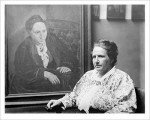TEACHING IS EASY
Chapter Two: Getting There (A Synopsis)
In chapter two of Teaching is Easy, the intrepid authors, Knighton and Persky, begin with both a logistical feint and a suddenly-morphed faux-folksy style, in subtle homage to Garrison Whatshisname of Lake Woebegone fame. Keillor, they belatedly recall, Garrison Keillor or however it’s spelled (although they don’t get to a full disquisition on the problems of teaching with Alzheimer’s until the aptly-titled chapter eighteen, "Gaga"). "Getting There" tackles the hardest part of teaching, namely: getting to the classroom. The authors demonstrate that it is ergonomically almost impossible to get from their fibreboard-walled veal-pen office cubicles in the Fir Building to, say, the Horticulture Building, where their classroom is located, while simultaneously balancing 1) a fully-loaded hand-held rather than backpacked book bag, 2) an engaged umbrella calibrated beneath the lazy pelting of West Coast rain, 3) a plastic-lidded cup of coffee, and 4) a lighted cigarette. In several exquisite digressions, they complicate the problem by considering the addition of 5) a thin white folding cane used by people who are technically desighted, and they also gratuitously review the history of Dada collage art as exemplified by the work of Werner Schmertz. They also include the sexist joke, "You can lead a Horticulture but you can’t make her think," but they attribute it to the famous 20th century sexist and author, George Bowering.
As it turns out, chapter two is not really about getting to the classroom at all, it’s about "this year’s lessons." Citing Jorge Luis Borges’ encomium that there’s no point writing a 500-page book about something you can explain in five minutes, K & P didactically offer the maxim, Teaching is easy because the students don’t know anything. Therefore anything the teachers say will come as news to the students. Although this searing observation occasions a few self-reflexive melancholic authorial sighs, prospective teachers are urged to look at the upside of a potentially despair-inducing RealPedagogik. In a series of scientific surveys about the cultural referencing capabilities of contemporary students, K & P reveal that as of Sept. 11, 2001, 98% of students were able to identify Britney Spears, 5% of students were able to recognize the name "Samuel Beckett," and 3% of students were capable of identifying and/or locating Kabul, Afghanistan. The latter demographic segment has now disappeared from the classroom, having all signed exorbitant multi-million dollar Special Op contracts with the Powers That Be.
Every year, K & P point out, teachers learn two or three lessons that they can teach to themselves and their students. This year’s lessons, they proclaim–at last abandoning their shilly-shallying faux-folksy style of discourse–are as follows. 1) As differently disabled instructors engaged in feats of ergonomic heroics (i.e. juggling the aforementioned bookbags, umbrellas, coffee cups, and lighted cigarettes, with or without the phallic pointer/cane), they are now more frequently using the automatic door-opening devices installed throughout campus to facilitate disabled student and instructor access to the site. Although they began using the automatic door-opening devices as a "felt necessity," they now use them even when not laden with the aforementioned items as an "academic luxury." 2) The Self is a construction of Total Vocabularies plus Experiences, plus a few minor genetic inheritances and environmental influences. A Total Vocabulary refers to the exponentially-aggregating interconnections between all the words in a lexical vocabulary and all the words in various "reference" vocabularies (such as those containing the item "Britney Spears" or the concept "quantum physics"). The introduction of new items to the vocabulary, such as "Samuel Beckett," "evolution," "Lance Reventlow" (a once reasonably well-known 1950s American playboy), and "Kabul," or "Deshambe" (the capital of neighbouring Uzbekistan, and a word that means "Monday" in Persian), ipso facto alters the composition of the Self. In sum, Who You Are is pretty much What You Can Linguistically Connect. 3) Democratic Elitism. Since the post-secondary institution, or Forward Base, as it’s sometimes known, is in this case located on a hill in a glade of mostly evergreen trees, the phrase "up here on the hill" can be employed both literally and metaphorically, and contrasted to the notion of "at the bottom of the hill." In this instance, what is literally at the bottom of the hill is the parking lot of the Great Canadian Superstore grocery emporium. In a series of dramatic but extemporaneous monologues, that supermarket parking lot is portrayed as a site of barbarism, mayhem, and Baskart carnage, where people with small Total Vocabularies read nothing more taxing than the sports pages of the local tabloids, while "up on the hill" a privileged elite peruses the pages of Proust, Coupland, Ondaatje, Rorty et al.. The third lesson is: a) that while the people at the bottom of the hill have smaller vocabularies than the people up on the hill, neither group is necessarily smarter than the other (that’s the democratic part of the lesson), and b) the people with large Total Vocabularies interpret reality more interestingly than those with minuscule Total Vocabularies (that’s the elitist part).
Chapter two concludes with a Tying-Up-Loose-Ends Dept. footnote: Who was the one student unable to identify Britney Spears? Answer: Immigrant youth on student visa from an obscure Absurdistan that has yet to be oppressed by satanic Western electrification.
Stay-tuned for salacious Chapter Three synopsis: Release Sections–A Non-Teaching Nirvana.
891 w. November 30, 2001


